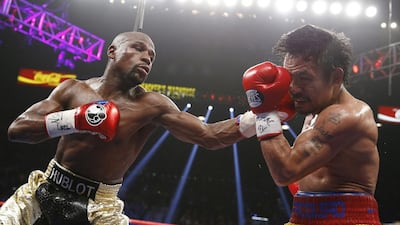There is a quirk of American televised sporting events – and it may be a worldwide quirk, for all I know – called the “television time out”.
That’s when play is suspended for a few minutes, not because of a player injury or a call by the referee, but because the television network broadcasting the match needs to run some advertisements. The network is allowed to demand a pause in play – the players usually stand around idly, looking apprehensive and foolish – while the television audience is treated to a toothpaste commercial or something equally jarring. It’s irritating, I’m sure, to everyone in the arena, but the revenue generated from these interruptions are precisely the way that overpaid and pampered athletes remain overpaid and pampered.
Not all time outs are the same.
Last weekend, as boxers Floyd Mayweather and Manny Pacquiao were preparing to meet each other in the ring, the networks broadcasting the bout on pay-per-view channels called a timeout themselves.
It wasn’t a “television timeout”, though. It was a “technical timeout”. As the opening bell approached, major American cable and satellite companies discovered that their services, for some reason, had suddenly failed.
At first it must have seemed like the North Koreans, who had successfully hacked into the computer servers of Sony Pictures, might have managed to break into the video transmission of the boxing match. Instead, as quickly became obvious, it was just a case of technical overload – too many people trying to buy the broadcast at the last minute, all at once.
The result was a massive online traffic snarl that cut off the picture and forced broadcasters to delay the headline match for almost an hour. It must have been maddening for the athletes who were forced, I guess, to pace around their locker rooms, shadowboxing with tense anticipation.
Speaking as an abject coward, I wouldn’t want the job of telling either Floyd Mayweather or Manny Pacquiao that the match had been pushed back because the broadcasters didn’t have enough bandwidth. My best guess, after years of observing corporate executives in action, is that a lowly intern was deputised to go into the locker room and deliver the bad news. I wonder how that intern is doing right about now.
The delay may have created a tense atmosphere in the arena, but it also – and this is perhaps the worst outcome – turned millions of boxing fans into blood enemies of the cable and satellite companies that were charging more than $100 (Dh367) for the fight.
For years, cable and satellite providers have been telling people in Hollywood that the future of our business is in pay-per-view television. People won’t go to cinemas anymore, they’ve told us. When a big picture is released, instead of heading to the mall, audiences will click a button on their television remote controls and order up the premiere on their home screens. The entertainment business, these companies promised, will be an efficient, well-oiled money machine. The technology of data transmission, they said, will make cinemas and traditional television programming ludicrously old-fashioned.
Unless, as happened on Saturday, the whole thing collapses due to technical issues. For one very tense hour, the companies broadcasting the most-watched (and expensive) pay-per-view sporting event ever were tied up in knots of terror. They almost had to swallow hard and do the one thing no one in the entertainment business ever wants to do: give the customers their money back.
When it was all sorted out and the bell rang to start the fight, broadcasting executives were relieved, boxing fans were mollified, and cinema owners were celebrating their luck. The technical arrogance of the big-bandwidth cable and satellite broadcasters had been knocked down a peg or two.
The next time representatives of those companies swagger around Hollywood promising to “disrupt” the cinema owners, they’ll have a harder time making their case. Their “technical timeout” has provided cinema owners with something that might be called a “bankruptcy timeout”.
On the other hand, everyone in the media business should be worried about the newer methods of broadcasting the boxing match that emerged on Saturday night. Some people who paid to watch were happy to lend a hand to those who couldn’t – or wouldn’t – pony up. Possibly hundreds of thousands of people watched the bout on their phones, using live-streaming video apps like Periscope and Meerkat. Those with access to the broadcast merely held up their phones to the television and instantly became “broadcasters” themselves, blasting the sporting event for free.
In Hollywood, this is known as “piracy” or “theft”. But with one and a half billion smartphones worldwide – projected to be two billion, almost a quarter of the world’s population, by 2016 – another term for it might be “the future”, for which there is never a timeout.
Rob Long is a Hollywood writer and producer
On Twitter: @rcbl

